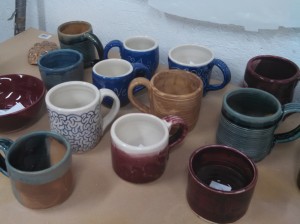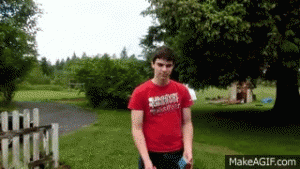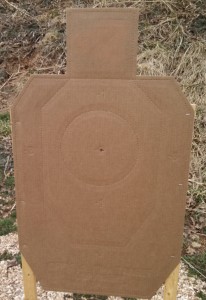I’m a dabbler by nature. Have a long string of casual hobbies. The list includes rockhounding, fishing, mural-painting, camping, hiking, gardening, and more. (Shooting used to be a hobby of mine too, but I found it so satisfying a pastime that it soon became an avocation and eventually a true vocation.) I own a ceramics kiln, and enjoy making wheel-thrown pottery and decorating my creations with my own glazes. I like to do Sudoku puzzles and crosswords, and when I can find someone who’s willing to play one with me, I enjoy word games such as Scrabble. At one time, I was going to learn how to sew, but it turned out that the idea wasn’t nearly worth the aggravation it caused. Somewhere between my injured fingers and the tangled threads and crumpled patterns, I realized that off-the-shelf clothing would keep me just as warm.
To be honest, I’m not particularly skilled at most of these endeavors, and haven’t put a lot of work into most of them. We enjoy picking up pretty rocks as a family, and I can tell you a tiny bit about how agates are formed or where you’re most likely to find snowflake obsidian or why thundereggs are so cool. But don’t ask me to identify most rock types at a glance, or tell you more than the most rudimentary facts about any rock’s chemical make up. I haven’t worked at it; I’ve only enjoyed the first few steps along the pathway, and stopped learning more when the effort stopped being worth the rewards I could experience at my low level of skill. Still, I can honestly claim that I know more about rockhounding than most people do, and that I’ve learned everything I know about it without much effort or discomfort.
That’s pretty much the way most people are, with hobbies. There’s nothing wrong with that, and much that is right about it. We can’t throw all our energy and all our passion into everything we do, unless we decide to become very narrowly focused indeed. Sometimes a general picture of the idea is all we need.
But.
There’s a level of joy, of wonder, that’s never available to the casual hobbyist. A level of delight that most don’t even realize exists until they’ve already done the work it takes to get there. And it’s most visible in the areas of physical skill. There’s a wild sense of elation, even abandon, that goes with struggling through a tough spot and reaching the other side successfully. That’s a type of joy that mere dabblers never can feel even though they, too, might be having fun doing the same basic activity.
Think of a small child at a skating rink. She pleaded with her mom to let her go skating with her friends. She’s only been skating a few times before, if ever. The skates feel heavy and weird on her feet. You can see a fierce look of concentration on her face as she shuffles along, holding onto the guardrail with both hands and trying desperately to keep her balance. As she slowly makes her way around the arena, she finally manages to let go with one hand long enough to wave to her friends across the room. Finally she manages a complete circuit of the floor, and she’s grinning from ear to ear. “I did it!” she calls to her mom. “I can skate!”
She’s definitely having fun. She has enjoyed every bit of her learning process so far, even though she was clearly afraid that she would fall on her bottom if she let go of the guardrail. She stepped (or shuffled) at least a little way outside her comfort zone, but she barely noticed it because the reward of being able to move along on skates felt so good to her.
Even though our very young lady might not believe this if we told her, she isn’t having nearly as much fun at the skating rink today as she will a year or two from now, when she’ll be gliding easily through the crowd and making up games she and her friends can play together on skates – assuming she doesn’t move along to another hobby entirely between now and then. She’ll have even more fun when she learns how to skate backward, so that she can hold hands and flirt with her boyfriend as they move through the crowd together. Or when, after much effort and many failed attempts, she finally nails a perfect double axle.
Here we get into some results of the Dunning-Kruger Effect. Lots of people think they’re “good” at their hobbies, and have gotten so without any hard work or unpleasant effort or anything that takes them out of their comfort zones – not even the minor discomfort of falling on their bottoms as they learn to skate. But really, it’s not until we’ve put a lot of effort into something that we realize how lacking our definition of “good” once was, or how badly we once overestimated our skills. 1
The little girl’s mom smiles indulgently at her daughter as she completes her circuit around the rink, and calls back to her, “Wow! You skated all the way around! Good for you!”
She doesn’t mean the little girl is done learning to skate. But she can share in her daughter’s joy, because she too was once a beginner. And she can look forward to the day her daughter will really learn how to skate.
What does all that have to do with us, or with firearms?
Just this: somewhere after the beginner’s grin, if shooting is nothing but a hobby to you, you may stop wanting to improve; or rather, you may start to feel that getting better won’t be worth the effort it takes to improve. You might get tired of thinking about it and decide you don’t want to learn anything more. Like me with rockhounding, you might decide you’re good enough. That’s okay, when it’s just a hobby; because, with hobbies, the joy of doing the activity itself should always outweigh the effort we’re putting into them.
And that’s okay. It’s natural. There’s nothing wrong with being a dabbler, when dabbling is all we intend to do. Please don’t read more into this than I’m really saying. For some people, learning to shoot is simply a hobby, nothing more, and that’s okay. People sometimes dabble in firearms just as they dabble in any other hobby.
On the other hand, if – for you! – shooting is more than a hobby, more than just something you do on Saturday afternoons, but is actually something that you believe might someday be used to save your life or the life of a family member, then it’s very likely that at some point past the beginner’s grin, you will find that you need to put in more effort at this than comes naturally to a dabbler. You might find that in order to move beyond the beginner’s world, you need to grit your teeth and keep going. You may need to force yourself over an effort-filled bump in the road, the one that pretty much stops most dabblers on the spot.
That might sound discouraging. It’s not, really. Because remember — there is a level of pleasure and joy in the thing itself, that the casual dabbler won’t be able to experience until she’s put in the work it takes to get there. The joy comes back again, stronger than ever, when we’ve forced ourselves to do the work that needs to be done. It’s not all grim determination, forever and ever without reprieve. It’s just a speed bump.
To get past that speed bump, you’ll probably have to do what a serious athlete does in order to reach a higher plane of performance (and joy). Your ultimate goal probably isn’t available to the casual dabbler anyway, and the shallow happiness of doing what feels good to us right now can never rival the deep joy we feel when we finally nail it after working hard to get there. Like a serious athlete, even though you will still enjoy shooting for its own sake, you’ll do more than fiddle around with it just for the immediate pleasure you feel in the moment. Instead, you’ll cast your eyes toward a reward you can’t yet completely see, and you’ll make the conscious decision to work hard for that reward. Just like the Olympic athlete, you sacrifice your own immediate pleasure in order to learn skills that aren’t instinctively comfortable to you.
To be more than a dabbler, do more than the dabbler does. Let another type of joy drive you: the long-lasting pleasure of knowing that your skills will help you take care of yourself and the people you love.
Notes:
- From the original paper: “In essence, we argue that the skills that engender competence in a particular domain are often the very same skills necessary to evaluate competence in that domain—one’s own or anyone else’s. Because of this, incompetent individuals lack … the ability to know how well one is performing, when one is likely to be accurate in judgment, and when one is likely to be in error.” ↩









good read, thanks. shot an IDPA match this morning, and because i was confident from prior practice, i nailed head shots instead of going for the easier body shots. made my day, knowing that i can hit such a small target under time pressure.